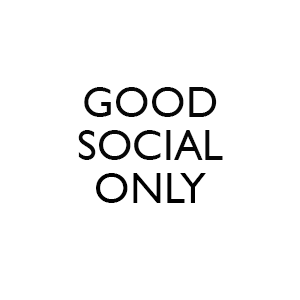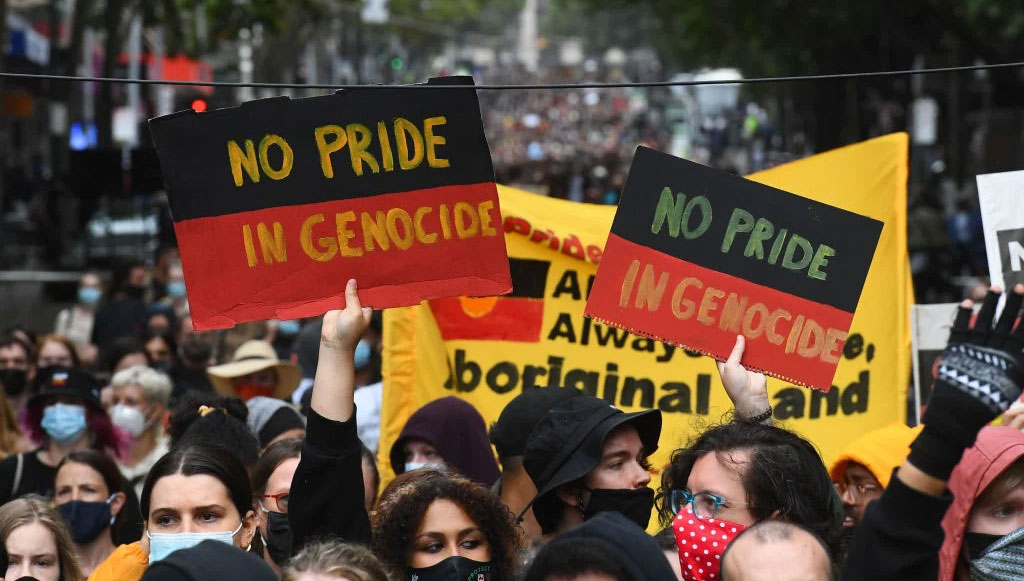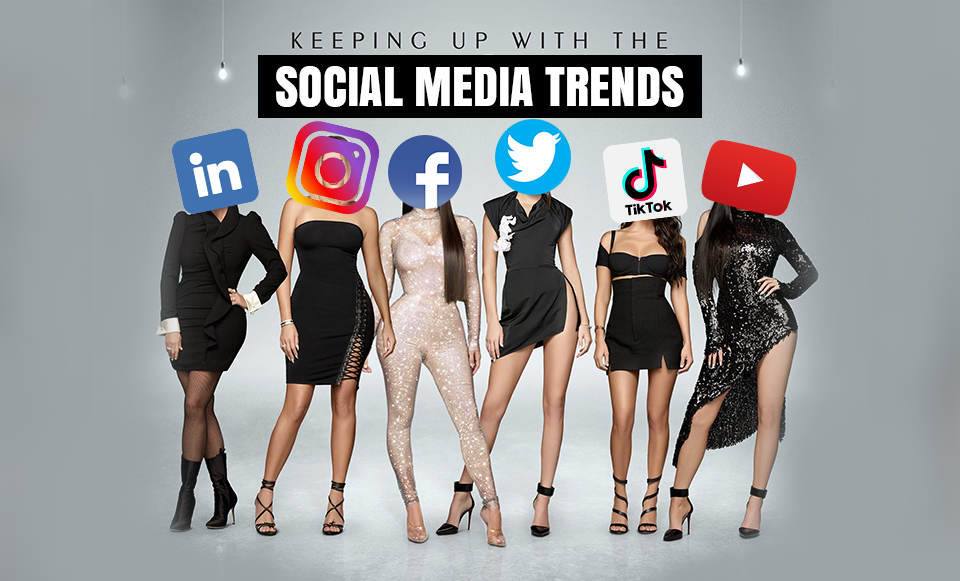Australia Day: Why Businesses and Not For Profits Cannot Stay Out Anymore

Facebook is Meta: So What?
October 29, 2021
Keeping Up With The Social Media Trends
March 29, 2022As I am writing this article, I am settling comfortably with a warm cup of tea and a beautiful view of a Jacaranda tree neighboured by a tropical Frangipani tree. It’s a moody day with heavy clouds in the sky persistently following our predictions of La Nina this Summer. I am also feeling heavy in my heart today.
I live, work and write on the land of the Gadigal Peoples of the Eora Nation, which is reminding me of my roots – Kievan Rus, first East Slavic state, now known as Russian Federation. Russia, Belarus and Ukraine all took origin here, in Kievan Rus. And I have been wondering whether my country of birth took its origin in Ukraine. Archaeologists are also searching for evidence to support the Viking (or “Normanist”) theory, which states that the early Russian people were originally Vikings. I realise, I am not entirely sure about my origin. Kievan Rus takes us back to 988.
26 January 1788 isn’t such a distant history.
I was reading “Fatal Shore” by Robert Hughes on my plane to Australia and on my bunk bed at a student lodge in St. Leonard, Sydney, when I first arrived in Australia in 2008. I spent three years prior to my landing here learning the history of the country I felt was a magical fairytale island far away in the sea.
Reading “Fatal Shore” and many other resources available to me at the time was difficult. I was shocked and terrified by the past of Australia. I was also eager to learn what became of this island, given such horrific past.
I spent most of my life learning Russian history as part of my school and University education. Genocide, wars, colonisation, slavery… it all took place in my country of birth. I was also living the history: Russia maintained its brutal face and Dark Ages beliefs all throughout my 22 years there. I was desynthesised to racism, homophobia, violence, abuse and injustice. Parts of me demanded change. But the fabric of my reality consumed me. I learnt that change wouldn’t take grip in my home.
When I landed in Australia and eventually surrounded myself with white cis peers who also couldn’t envision change or didn’t understand the value of changing anything, I once again found refuge in familiarity of my past unfolding in the country so far away from the land of my birth.
I knew Australian history. And knowing didn’t urge me to do anything. Ahead of me, I had many years of unlearning to do before I could form my own view of what was right and wrong.
Change indeed takes a long time. However, “long” is a descriptive adjective which doesn’t give us definite metrics. How long is long?
I have noticed that it takes about a month for an Avocado seedling to poke through the soil, during which time a Chilean Jasmine vine grows up to 3 metres long. I have always known that human pregnancy takes 9 months, learning that a Virginian opossum requires about 12 days, while an Indian elephant will always take about 22 months. Long time is an arbitrary time stamp, which doesn’t actually give us any time. My homeworld history feels so huge and so far away, while Australian heritage goes back only a couple of hundreds of years. Or so I am told when I landed here.
I didn’t ask enough questions, didn’t engage in controversial conversation and didn’t attend workshops, classes or ceremonies. I buried myself in books, listening to people’s stories and surrounding myself with different opinions.
I created my own environment of indoctrination, in which I could form my stand. I spent my next ten years here.
When I hear Australian history today I feel the urge to act.
My early inactive knowing metamorphosed into a deeper understanding, emotional connections and clarity.
Not only 26 January 1788 isn’t a distant history but it is also not a controversial conversation, not the matter of opinion, not a descriptive adjective with no meaningful metrics but a piece of recorded and well-documented history.
When a small city in Oregon, USA, was taken over by a small commune of a little-known religion and was renamed into Rajneeshpuram in the 80s, the Americans of that small city, previously (and today) called Antelope, were terrified and hated their invaders, trying to claim their city back, and understandably so.
Violence was inevitable. The invasion was found illegal. Participants were eventually drawn away. The people of Antelope got their city back.
As I was watching the documentary about the ordeal I couldn’t help myself but draw parallels with the invasion that took place on 26 January 1788 when a ship full of weird looking people arrived to the shores of Australia and planted their flag into the soil, someone else’s soil. Peoeple already lived here, just like the people of Antelope who were shocked by the strangers’ behaviour.
Indigenous Peoples never got their land back.
People of Antelope received Federal support. They were pitied and understood. They were invaded. And it had to stop.
Indigenous Peoples of Australia were mass murdered.
And it started on 26 January 1788.
As Russia has been rounding military troops in huge numbers (100,000) near by Ukraine’s border, many countries around the world have been condemning Russia. Today, when Earth is divided amongst tribes (countries, cultures and nationalities), we find it inconceivable that invasion can be taking place. We are civilised people, at the end of the day. We are people indeed, 96% similar to the Great Ape species.
I believe that everyone ought to take their own time and tools to learn and make their own stand. Unfortunately, we are often busy with work, mortgage and rent, children and bills. At the end of each day we just want to kick off our shoes and get a drink at a pub.
26 January has given white Australians their needed respite from the everyday grind: a public holiday, a day off when we venture to the parks to barbeque and to the pubs to gamble and drink. It’s been joyous! Why would we ever disturb this heavenly tradition?!
The answer is simply to me: genocide! I do not feel like drinking or even eating on a day like today. While many white Australians are celebrating what it means to them to be Australian, Indigenous Peoples are reminded of their place in our society – swiped under a dirty rug. And this is happening in their own home.
Australian history is widely available, so I don’t need to help you learn more. However, I want to try persuading you why your business or/and not for profit ought to care.
Good Missions Create More Opportunities
As history moves on, the discussion around changing the date has been growing. With each year, more people care about the change. Eventually, their voices will be joined with the majority. Just like the embarrassing Australian Marriage Law Postal Survey ensured same-sex marriage in Australia, eventually Australia Day will cease to exist as you know it.
This means that if you continue hiding behind the “we don’t want to displease our community online” excuse you will eventually find yourself suddenly on a very publicly wrong side. Many organisations will rush to re-write their website copies and create social media content, unprepared for what is bound to happen. If this year you aren’t prepared to voice your stand, take this opportunity to think about what you stand for. Now is the time to sit with your feelings, have internal conversations with your staff, learn, listen and decide what your organisation stands for and what you believe in. It matters to your mission, the quality of customer service and should affect your goals. Your customers and clients are also people – they can feel your brand, connect with your mission and spend their resources with you because they feel aligned with what you stand for.
Politics Can Make or Break Your Operation
Some organisations say that they have nothing to do with politics, so this issue doesn’t apply to them – they just do their work and keep their heads down. However, of course, your organisation, whether it’s a small business or a global not for profit, has a lot do with politics. Politics decide how much tax you pay, who you can trade with, what is the legal age of hire, what you can and cannot do, etc. Politics can make or break your entire operation.
Growing up in the 90s taught me that lesson especially well. During the Soviet Russia, any type of commerce was illegal, so everyone was a government employee. This of course doesn’t mean that business didn’t exist. It was simply illegal. When USSR collapse in 1991, suddenly commerce was a legal but not yet honourable pursuit like it’s often seen in Australia. Crime blossomed alongside business opportunities. In Russia, so known, “Wild 90s” was a truly wild ride. My family slept with a gun under their pillow. Times were uncertain and dangerous. And it followed after the collapse and change of politics.
Your organisation can also influence politics. You can choose where and how to invest your resources, use your right to vote, sponsor causes, lobby your local government, participate in scientific research, etc.
Lean Into Controversy
Finally, 26 January isn’t a controversial topic. I know many people don’t want to engage or showcase their stand under the weight of the fear of controversy. However, mass murder isn’t very controversial but rather factual. Moreover, there is no part of anyone’s life that isn’t controversial. There is simply a matter of trends.
The school you choose for your children can be controversial, choosing unethical suppliers can be controversial, your mission statement can be a source of controversy.
What’s more, why avoid controversial topics? If something feels uncomfortable, it most likely means that we must pay attention. If something seems controversial, it’s trying to make us look, pause, listen, think.
Whichever path you choose today, you will encounter those who disagree. Why not choose that what you believe is right? Your social media community, customers and clients will appreciate your honesty and effort. Your integrity can be smelled miles away!
26 January: you cannot stay out of it anymore.
P.S. Whenever you are ready… here how I can help you leverage social media technology to really power your mission:
I design simple and effective social media campaigns helping gifted not for profits and businesses for purpose leverage their social media technology and loyal community to really power their mission, building more donations and creating more income and impact. My custom work is designed to support your specific goals, setting up your work for long-lasting results and prosperity.
There are many ways you can reach out to see if I am a good fit for your goals.
Check out the Facebook Messanger bubble on the bottom right, contact page on the top and/or a form and a calendar, if this type of communication suits you better.
I look forward to supporting your vision of the future!




